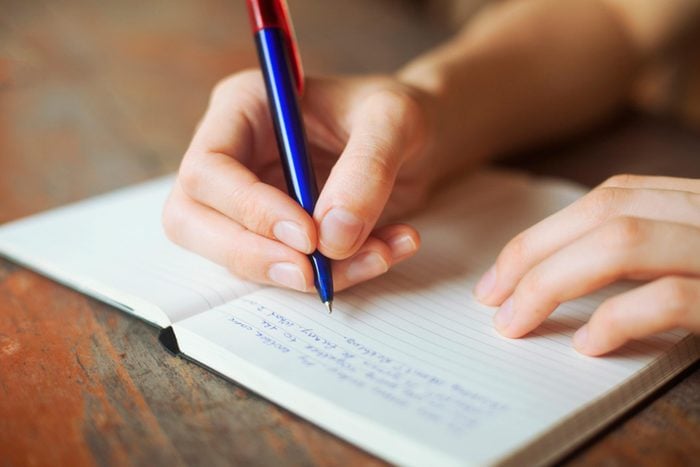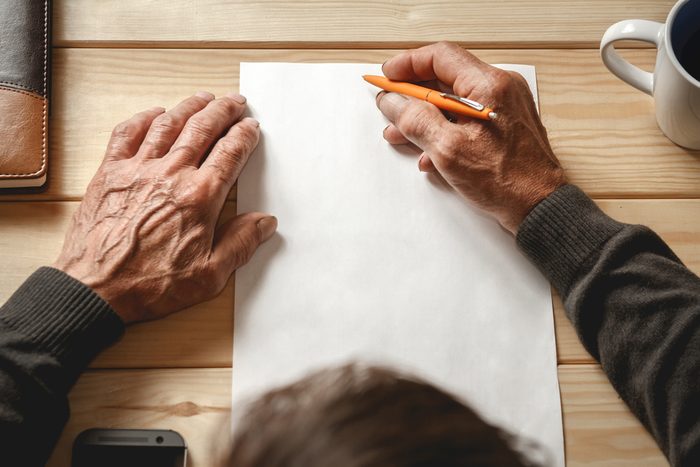The three steps of making a memory
Quick: Can you remember your last birthday party? The day your child was born? What you bought at the grocery store yesterday? What you decided to cook for dinner tonight? Every day our brains have to remember thousands of different pieces of information and even though it may look easy, there’s a lot going on behind the scenes, says David A. Merrill, MD, PhD, psychiatrist at Providence Saint John’s Health Center, director of the Brain Health Center at the Pacific Neuroscience Institute in Santa Monica, California, and professor emeritus of psychiatry at UC Berkley.
There are three steps when it comes to making a memory, he says. First, your brain needs to focus or pay attention to something. Next it will visualize it, making a mental image of it. Last, it will make associations with other memories to help put it in proper context. A break in any part of this chain can lead to you forgetting the thing or not even remembering it in the first place, Dr. Merrill says. Learning how to maximize each of those steps is key in improving your memory. “Memory is not fixed; no matter how bad you think your memory is, everyone can improve!” he adds. The exception is those with later stages of dementia.

Pay attention
“A lot of ‘forgetfulness’ is simply the result of not listening or concentrating properly in the first place,” says Catherine Loveday, PhD, a psychologist specializing in the neuropsychology of memory, a professor of psychology at the University of Westminster in London, England, and author of the book The Secret World of the Brain. “If you really want to learn or remember something, then focus your attention.” If you keep losing your glasses, to improve your memory, start making a mental note every time you set them down. If you read an article about something you know you’ll want to tell friends about, spend an extra second on the juicy bits so they’ll stick in your head.

Remember that practice makes perfect
When you were a kid, did you ever have to recite a poem in front of your class? You knew it then, and it’s still true: To improve your memory, you have to practice to get information installed in your mind accurately. “Whether it’s learning to play the piano or remembering a lovely day out with a friend, we only remember by going back over things again and again,” Loveday says. You’re practicing when you tell your mom about the gift you’re planning on buying for your sister, or when you explain a recipe to your spouse—that information will be more permanently recorded in your brain because you’ve thought it through another time. “This strengthens the neural pathways in our brain,” Loveday says. Don’t miss these other anti-aging tips to keep your brain young.

Play brain games
“When it comes to mental acuity, it really is a ‘use it or lose it’ situation,” Dr. Merrill says. “You should be doing a daily memory workout for your brain, just like you do a daily physical workout for your body.” One way to do this is to play games that actively stimulate different parts of your brain. You can do memory games, crossword puzzles, Sudoku, logic games, wooden or metal 3D puzzles, jigsaws, or go high-tech with a brain games app or website. The key is to challenge yourself with different types of games to work different parts of your brain and different types of memory, he says.

Vizualize memories
If you really want to remember something, try visualizing it by making a mental image or mentally rehearsing it, Dr. Merrill says. Visualization is the main tool people with “super memories” use to do feats like memorizing an entire deck of cards in under one minute. The more you visualize it, the stronger the connections in your brain and the more concrete the memory will be.

Write and draw in a journal
In the meantime, another way to improve your memory by solidifying the storage of facts and events for the long term is to relive day-to-day events or details about important milestones in your life in a variety of ways—Loveday calls it mixing and matching. “The richer the learning experience, the more likely we are to remember it,” she says. “Read it, watch it, talk about it, draw it etc. The more ways we experience something, the easier it is to cue that memory later on.” Journaling can also reduce stress.

Get plenty of sleep
The physical process of memory storage in the brain depends on sleep, so don’t skimp on it. Recent studies have started pinning down how it works: People who got a good night’s sleep did better on tests that measured both working memory and long-term memory, according to a study published in PLoS One. “A good night’s sleep is vital,” Loveday says. “Numerous experiments have shown that a lot of memory storage occurs while we sleep.” (Here’s what else happens to your brain while you sleep.)

Exercise
“Walk, run, swim,” Loveday says. “Anything that gets your muscles moving and heart working has a positive impact on overall brainpower, and there is evidence that it may specifically boost the chemical processes that enable the brain to learn.” Regular aerobic exercise can actually increase the size of the hippocampus, which may improve your memory overall, according to a study published in the British Journal of Sports Medicine. But other research has shown immediate benefits to moving while learning: Subjects in a study published in the journal Behavioral and Brain Function who walked while they studied foreign-language vocabulary remembered what they learned better than those who sat while they studied. If you can, try working out at this time—some research found it could be the best time to exercise for memory improvement.

Protect your mental health
Depression, in particular, has been linked to both short-term and long-term memory problems, according to a study published in Psychological Medicine. “Depression is related to volume loss in the brain, including parts directly associated with memory and memory problems can be a symptom of depression,” Dr. Merrill says. So whether forgetfulness is a consequence of mental illness or a contributing factor, you should definitely make sure you seek treatment if you suspect that you have depression or anxiety—you’ll feel better and more functional day to day and improve your memory, he says.

Watch your medications
Certain drugs, including some antidepressants, tranquilizers, and blood pressure medications, have been linked to forgetfulness, Dr. Merrill says. If you think a medication you’re taking might be making you confused or sedated, check with your doctor, because there are good alternatives to most of the common offenders. Be careful, too, not to take Benadryl more often than you need it: A 2015 study published in JAMA Internal Medicine found evidence that long-term use of anticholinergic drugs—so named because they block the action of the neurotransmitter acetylcholine—is linked with dementia. Besides Benadryl (otherwise known as diphenhydramine), other anticholinergic medications include some antidepressants and bladder-control drugs. Medication is one of the medical reasons your short-term memory is getting worse.

Be social
Spending time with friends and loved ones is an important factor in brain health in general and memory specifically, Dr. Merrill says. “Our brains are wired for human connection and a big part of that is making memories together,” he says. Having a rich social life not only reduces stress but is a great way to make sure you have lots of opportunities to rehearse and relive the memories you’re forming, and thus improve your memory, he says. If you read a novel on your own, you might not remember all the details in it, but if you discuss it with your book group, you’ll have chances to describe what really moved you and you’ll be reminded of secondary characters that your friends found memorable.

Use smartphones wisely
“Smartphones can be a fantastic way to support our memory,” Loveday says. She suggests using alarms and reminders as a way to free up mental space: “If you are continually thinking, ‘I mustn’t forget to pick my son up at 4 p.m.,’ then you’re not able to focus on what you’re doing.” Be careful when it comes to using your camera phone, though. People who take lots of photographs are so focused on the visual aspects of their experience that they don’t remember key information they heard and may be less able to remember the experience as a whole, according to a study published in the Journal of Applied Research in Memory and Cognition. It is such a common experience they even gave it a name: “The photo-taking impairment effect.” So if you want to treasure the memory of your child’s first birthday for years to come, use your phone to keep track of the guest list, take a few snaps, and then put it aside and just focus on enjoying the party.

Don’t totally outsource your memory to Google
Depending on phones and computers to remember things for us is called cognitive offloading and while this can be useful in many cases (trusting your phone to get you to a store you’ve never visited or to remember all your friends’ phone numbers), the feeling that we can just look something up makes us less likely to expend the little effort required to remember what we just read, Dr. Merrill says. Loveday, however, says we still come out ahead: “In many ways, having access to the Internet means that we are able to learn more faster,” she says. “While the Internet may mean that we use our memories slightly differently, there is no evidence that it has a negative effect on our ability to learn and remember.” (These other habits could seriously age your brain.)

Quiz yourself
If you’re trying to memorize the names of all the dogs at the park (or the important events leading up to the Revolutionary War, or the major events in the Marvel Universe), you’ll quiz yourself to see what you’ve learned and what you still need to focus on. But evaluation isn’t the only benefit of self-testing—it also gives you valuable practice recalling the information, according to a study in Psychological Science. The students who were tested on new information as soon as they’d learned it remembered it better a week later than those who just studied in the interim.

Move your eyes from side to side
Next time you open the refrigerator and immediately forget what you were looking for, you might want to spend a few seconds moving your eyes rapidly from left to right and back again if you’re trying to improve your memory. Repeating the same eye pattern movement, “rehearsal strategy,” is a way to help recall, a 2018 study published in the Journal of Experimental Psychology: Human Perception and Performance found. So when you’re trying to remember a certain thing, moving your eyes a certain way while you’re encoding the information, and then doing the same while you’re trying to remember it may help.

Reduce stress
Stress damages the hippocampus—a structure important for learning and memory—altering how neurons connect with each other which affects both your short- and long- term memory, Dr. Merrill explains. “Stress makes you less able to focus to learn new things and also more forgetful so it’s harder to remember them,” he says. Making time each day for de-stressing will have big payoffs with your memory, as well as other important health benefits like a lower risk of heart disease and mental illness. He recommends deep breathing, meditation, learning or practicing hobbies, and exercise. Here are the other effects of stress on your brain.

Make time for hobbies
Love to build model airplanes? Read novels? Play the piano? Hobbies are a workout your brain and can strengthen your memory in different ways, Dr. Merrill says. Getting really into a hobby helps you achieve a “flow state” which is prime time for learning and remembering, plus they reduce stress which is also beneficial for memory, he says. Next, check out the habits of people with impressive memories.
